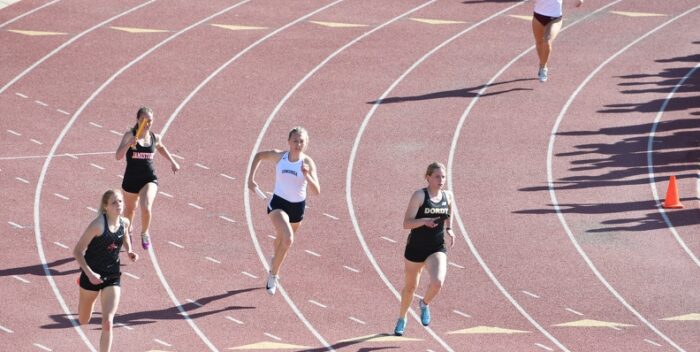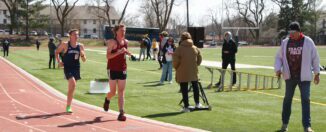Name, Image, and Likeness contracts can help student athletes make money
Photo description: Track athletes round the corner during a sprint relay
Photo credit: CUNE Photo Gallery
Caleb Lemon
Sower Staff
The National Collegiate Athletic Association is where Name, Image and Likeness receives the most attention, but the trailblazers of NIL belong to the National Association of Intercollegiate Athletics, meaning Concordia athletes now have a chance to make money off of their influence and image.
NIL allows players to receive financial compensation, not based on their performance – although that may help them gain recognition – but for their image. Players can receive money from businesses by marketing their name and through other promotional efforts.
The NAIA was the first sports organization to legalize NIL, which allows athletes across the nation to participate. The NCAA followed soon after, bringing it to everyone’s attention.
As of May, there had been 77,000 athletes across all divisions who had participated in an NIL deal, but only 300 were from the NAIA. Concordia has had 11 athletes explore potential deals, and six of the contracts have been approved.
Paige Salveter, vice president of Marketing and Athletic Communications at the NAIA National Office, said she thinks the numbers will rise once students become more knowledgeable on the topic.
“It’s a lack of understanding that even the small deals are actually great deals,” she said. Sometimes smaller deals end up turning into larger ones down the road, she added.
Most of the athletes who have taken advantage of NIL come from the sports of football, women’s volleyball and both men’s and women’s basketball and baseball.
The rules and regulations of NIL state that players cannot get paid for their on-field performance, but can be paid for their image, which includes name and likeness. Although the deals are not as flashy as some in the NCAA, Salveter said that the opportunities for athletes in the NAIA to sign deals are the same.
Salveter said that the NAIA stands out from the NCAA in the sense of how easy it is to close deals.
“The NCAA does not currently have a formal disclosure process, unlike the NAIA, who is partnered with Opendorse,” said Salveter.
Eighteen of the 21 NAIA conferences are partnered with Opendorse, the leading NIL marketplace and technology company. This means they help the student athletes with everything from education on NIL to finalizing deals.
The Great Plains Athletic Conference, which includes Concordia, has Opendorse as its main option because of the user-friendly app. Opendorse is not the only option; however, it is among the easiest to use. It is not mandatory to go through Opendorse, and some athletes prefer to create deals on their own.
No matter the route the athlete takes they still have to check with their school’s athletic office to make sure the contract is based on image and likeness and not pay-for-play.
Concordia Associate Director of Athletics Angela Muller said the only time she gets involved is right before both parties sign an NIL contract.
“I meet with the student and talk through the opportunity, and if it falls in the correct guidelines I send it to the NAIA for complete approval,” Muller said.
The athletic office at Concordia is more than willing to help when needed, but unlike in the NCAA, Concordia expects the student to take the initiative. In the NCAA, many athletes are pursued by businesses or other organizations because their TV time reaches more people. At Concordia, along with the rest of the NAIA schools, athletes need to be proactive and reach out to businesses or entities.
Muller said it isn’t because CUNE doesn’t want to help, but because it is against the rules for the athletic office to initiate any potential deals.
“We will not develop, execute, operate or negotiate noninstitutional NIL activities for the athlete,” Muller said.
At Concordia, NIL deals have been made by a few athletes but they declined comment.
Victor Santana, a junior on the Concordia baseball team, said he does not have a NIL deal.
“It would be an awesome opportunity to have an NIL deal,” Santana said. “I would choose Lululemon to work with because I have spent so much money at that store and I am always wearing their clothes.”
Muller said she wants to make sure people know the deals that are made in the NAIA are not going to be as flashy as those in the NCAA.
Bre Romero, a junior on the cheer team, said she did not have a specific company in mind but is open to an offer.
“I was not sure that cheerleaders could get a NIL deal, but I would for sure accept a deal if I could,” she said.
Cheer team members are eligible for NIL deals under NAIA and NCAA rules.
“In most cases, the deals that we’ve seen at Concordia are not life-changing, but some money is better than no money,” said Muller.
In most cases, the amount of money received by NAIA athletes is pretty low. There have been deals with NAIA athletes as low as $30 and as high as $30,000. There are other deals where the compensation is not
financial; athletes can potentially get free gear to wear.
Deals with Concordia athletes have been mostly local, but that doesn’t mean athletes are limited to businesses around campus. The main message from Concordia and the NAIA is that an NIL deal may be worth a try for student-athletes.
Salveter said NIL deals can help students financially but also bring attention to the athletes’ schools.
















